

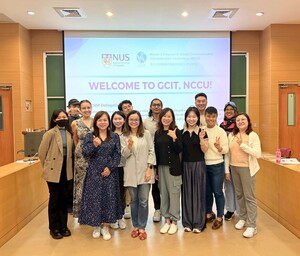
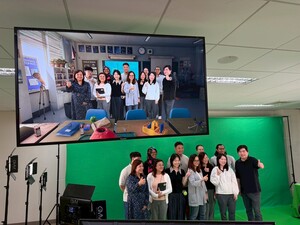
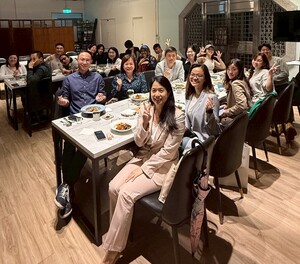
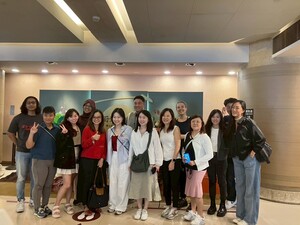
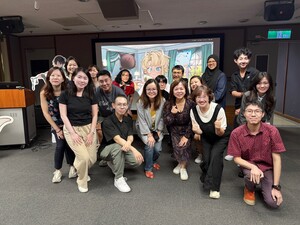
【Article by GCIT】
The Master’s Program in Global Communication and Innovation Technology (GCIT) at National Chengchi University (NCCU) and the Department of Communications and New Media (CNM) at the National University of Singapore (NUS) jointly hosted a four-day exchange program in Taiwan from May 26 to 29. Building upon the collaborative visit to Singapore in April, this initiative further strengthened the partnership between the two institutions in media and emerging technology.
Jointly led by the GCIT Director and Distinguished Professor Trisha Lin and CNM Head , Professor Natalie Pang, the exchange integrated academic dialogue, cultural immersion, and industry visits. The program aimed to enhance students’ global media literacy and foster innovative thinking for cross-cultural collaboration.
The opening ceremony on May 26 was attended by Professor Herng Su, Vice Chancellor of the University System of Taiwan, along with Director of GCIT Trisha Lin and Assistant Professor Christine Cook, who welcomed the NUS delegation. Guests explored the GCIT New Media Studio, an experiential teaching space equipped with VR technology, live-streaming systems, and green-screen capabilities. Professor Trisha Lin also delivered a keynote address titled “Taiwan’s Media Landscape and Digital Transformation,” offering an in-depth analysis of Taiwan’s strategies in navigating digital transformation and combating misinformation. The evening concluded with a welcome dinner, setting the stage for future collaboration.
Blending Culture and Technology: Innovation in Practice
On May 27, the delegation visited the National Palace Museum, where they learned about Taiwan’s “museum without walls” approach to cultural preservation through digitization and interactive exhibitions. Later that day, participants attended a lecture by Professor Tsung-Jen Shih, Director of NCCU’s Media Research & Development Centre, addressing digital threats and misinformation in Taiwan, followed by a hands-on exploration of XR Hub NCCU—the first university lab in Taiwan to collaborate with Meta—where students experienced AR, MR, and VR immersive applications.
On May 28, Distinguished Professor Tammy Lin, Director of the International Master’s Program in International Communication Studies (IMICS), offered insights from media psychology on Taiwan’s forward-looking policies regarding the ethics of VR, AR, and the metaverse. The delegation also visited the Public Television Service (PTS), gaining a deeper understanding of Taiwan’s public media mission and its commitment to diverse, non-commercial storytelling. They also explored the burgeoning VTuber culture and how virtual identities and livestreaming are shaping new forms of digital narrative.
On May 29, Professors Natalie Pang and Trisha Lin co-hosted a session on generative AI. Professor Pang highlighted innovative applications of AI in Singapore’s cultural sector, while Professor Lin discussed Taiwan’s strategies for addressing the challenges posed by deepfakes. She underscored the critical importance of content verification, media literacy, and creativity in navigating this rapidly evolving landscape.
That afternoon, the delegation visited the Taiwan Contemporary Culture Lab (C-LAB), a repurposed military site that has become a hub for interdisciplinary collaboration among artists, technologists, and social innovators. The exhibition Incurable Alliance, featuring work by ten HIV-positive artists from the Asia-Pacific, showcased art as a powerful medium for personal and social narratives. The final stop was at the Social Innovation Lab, where participants witnessed how a former military facility has been transformed into a civic innovation hub supporting open government and digital democracy.
This immersive exchange not only deepened the academic ties between GCIT and CNM but also laid a solid foundation for future collaborative initiatives, highlighting the essential role of media as both a cultural bridge and a catalyst for innovation.
[此中英文稿和圖片以及全球傳播與創新科技碩士學位學程均獲得中華民國文化部的補助。]